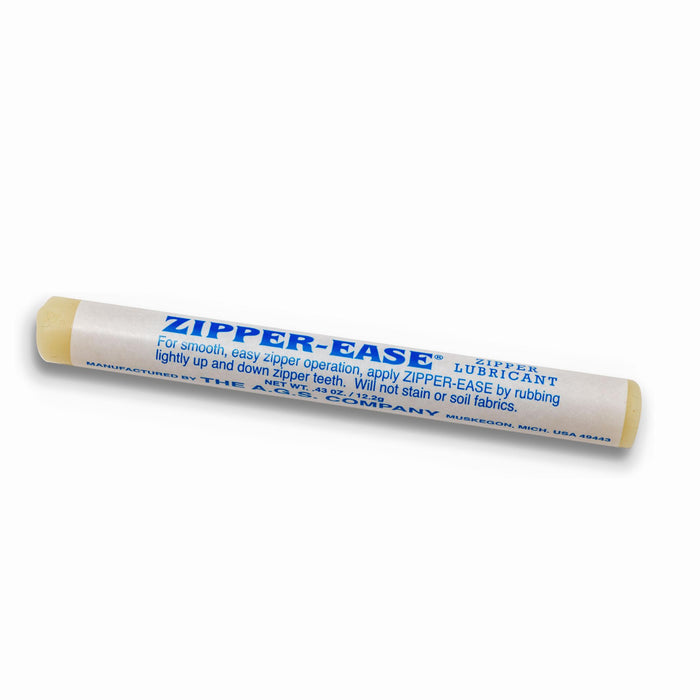How to Lubricate a Zipper (5 Solutions)
Posted Saturday, February 18, 2023

Lubricating a zipper is a standard part of maintenance. While it’s helpful to know how to lubricate a zipper before it gets stuck, this is often why people look for suggestions.
Luckily, there are plenty of options for how to lubricate a zipper. Below are 5 of the best.
Why Do Zippers Need Lubricating?
At some point, all zippers will need lubricating. For metal zippers, it can be because the coating has worn away or the teeth have gotten a bit rusty. But there are plenty of other reasons why some zippers aren’t as smooth as others. These include:
- They’re dirty
- There’s debris between the teeth
- Age of the zipper
- Exposure to the elements
- Type of zipper
- Level of care and maintenance
If you notice your zipper isn’t sliding properly, it’ll be worth cleaning it before you apply any lubricant. We have a full article on how to clean a zipper, so check that out first!
When to Apply Zipper Lubricant
You should use zipper lubricant after the item has been cleaned or washed. For example, if it’s a zipper on a pair of jeans, a jacket or a bag, it’ll be worth applying a small amount of lubricant after the item has been through the washing machine.
Other than that, regular application of lubricant can help prevent the zipper from getting stuck. How often you apply it depends on how often you use the item. For items you use daily, consider using lubricant on the zipper once a month or so. For less regularly-used items, every few months should be fine.
Finally, there’s the obvious purpose of unsticking a zipper. Provided it’s not got something caught in the teeth, using zipper lubricant is the easiest way to get a zipper moving again. Hopefully, though, with regular application, it’ll never get to this point!
5 Ways to Lubricate a Zipper
1. Zipper Ease
Generally, the best product to use for lubricating a zipper is a purpose-designed lubricant like Zipper Ease, which we carry at Zipper Shipper. It’s a stick of clear wax that you rub along the zipper teeth to keep things moving smoothly. You can use it on both metal and plastic zippers, which isn’t the case for many household products.
While there are tons of other options, a dedicated zipper lubricant doesn’t risk staining fabrics.
Pros
- Dedicated product for lubricating zippers
- Doesn’t risk staining or ruining fabric
- Can be used on plastic and metal zippers
Cons
- Won't necessarily unstick a jammed zipper
2. WD-40
WD-40 is a well-known brand of lubricant. If you were to use it to lubricate a zipper, you’d be best to use a silicone lubricant. Traditional WD-40 is petroleum based and can damage plastics.
While WD-40 is one of the best lubricants on the market, it might not be the best option for use on fabrics. Silicone lubricant can be used on metal and plastic zippers, but it can stain or soil fabrics if you spray too much on. It’s the heaviest-hitting option, but can also do the most damage to fabric.
Pros
- Will always unstick a zipper
- Generally inexpensive
- Silicone lubricant is fine for plastic and metal zippers
Cons
- WD-40 will stain fabric
- Traditional WD-40 can’t be used on plastic
3. Oil
If you’re really stuck for how to lubricate a zipper and don’t have a specialist product in your home, a Q-tip dipped in oil can help. This includes cooking oils, such as olive oil, vegetable oil, and so on.
There are a few problems with this option, though. First, food oils can spoil over time, which leads to them smelling. It’s not a big risk but is worth mentioning. Second, oil can stain fabric, although this is a risk with almost anything other than dedicated zipper lubricant.
Pros
- Accessible option if you don’t have anything else
- Easy to apply using a Q-tip
- Oil is fine for metal and plastic zippers
Cons
- Oil will stain natural fabrics
4. Wax or Soap
These options are grouped together because they rely on the same basic principles. Bar soap (rather than liquid soap) contains fat, which is a good lubricant. Wax is also a good lubricant, which you can find in crayons or candles.
There aren’t any massive risks with any of these products. Colored candles or soaps can leave obvious residue on your zips, but you should be able to wipe this away. Wax and soap will work better on metal zippers than plastic, although both types should be fine.
Pros
- Provide good lubrication
- Easy to wipe off
- Suitable for plastic and metal zippers
Cons
- Colored wax or soap will leave obvious residue
5. Other DIY Options
There are tons of other household products you can use to lubricate a zipper. Most contain some kind of fat or wax, which, as we’ve established, are decent lubricants. Some popular options include:
- Chapstick
- Vaseline (petroleum jelly)
- Liquid soap
- Graphite pencil
The only exception to the fat or wax rule is graphite pencil. It works as a lubricant in the same way it works as a pencil: it deposits a layer of graphite as you rub it along the teeth.
All the options above can work, but are probably best avoided if possible. They’ll all leave some kind of obvious residue, such as graphite or a fragrance. Some, such as Vaseline, risk staining fabric, too.
Pros
- Most people will have at least one of these items lying around
- Fine to use in a pinch
Cons
- These items will leave some kind of residue - not suitable for natural fabrics
Final Thoughts
As you can see, there are plenty of ways to lubricate a zipper. Arguably the best is Zipper Ease because it’s a dedicated zipper lubricant. It gives you all the benefits of a wax lubricant without the risk of staining or marking fabrics.
Whatever you use to lubricate your zipper, make sure you’ve given it a good clean first to keep everything running smoothly.
Zipper Shipper is an e-commerce business specializing in zippers and zipper accessories. Occasionally we will provide links to other sites when recommending products that we don't carry but may be useful to our customers. In some of those instances, we may earn a commission.





















